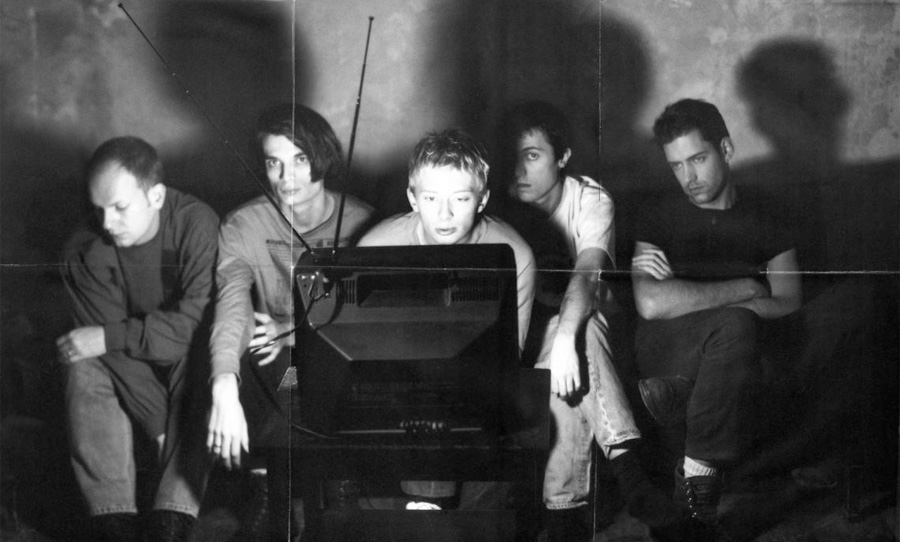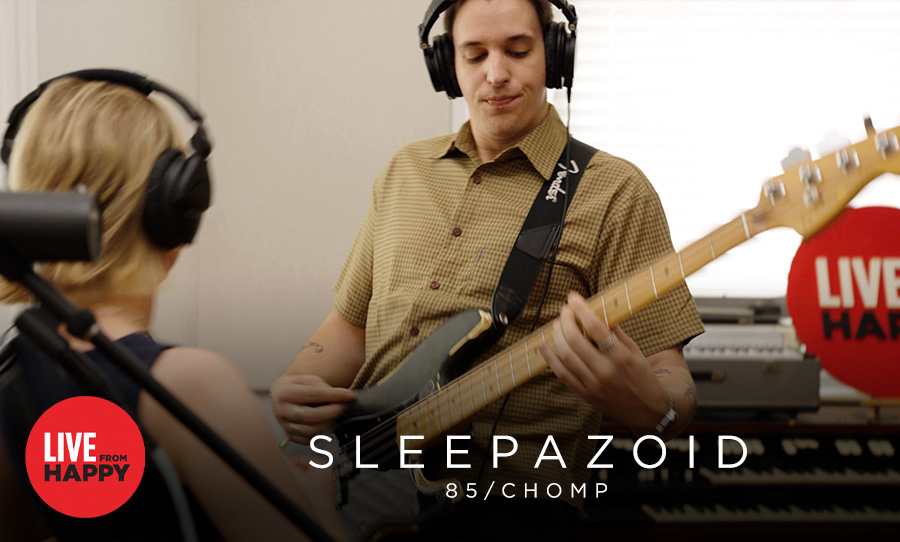Barney Hoskyns has compiled a book about Radiohead, titled Present Tense: A Radiohead Compendium. In its opening pages he praises the band, but not so total is his belief in Oxford’s premier gloom-mongers to suggest that they are the greatest or even one of the greatest musical acts of the last two-and-a-bit decades. He puts that to the reader to decide.
A simple enough question to address, especially if you are launching into the typical awesome-terrible dichotomies many a music fan would make. But stepping back a little and attempting some kind of critical distance makes answering this more difficult. The full meaning of a life is usually not apparent until it’s over. Radiohead’s 28-year journey is not. The band is still in motion, their narrative incomplete.

Were Radiohead really that great? Let’s not wait until they’re dead to decide.
But where are they really at? For a group so highly praised, one holding what Anne Powers best describes as an “outsized reputation” in her 2006 interview with Thom Yorke, the curious could be forgiven for scrutinising whether Radiohead truly command the idolatry they have invoked. Were they really that significant? Are they still? Do they still amaze? Can they?
Creep and the trilogy records – The Bends, Kid A, OK COMPUTER – that followed saw the band assuming the mantle of both rock’s unlikely heroes and pop’s outsider heavies. Neither title sits without merit, but again, is Radiohead as important as their most audacious fans and critics would herald them? When NME proclaimed The 1975’s A Brief Inquiry Into Online Relationships the millennial generation’s OK Computer last November, they may have been making jest but beneath the tongue-in-cheek hyperbole lay the possibility that Radiohead’s third record, one once considered sacrosanct or as Hoskyns would put it “a musical Matterhorn”, is no longer as unassailable of a peak as previously thought.
Maybe the mountain itself is just a little smaller than it once seemed. Perhaps there’s a younger generation more confident they can scale it. All art exists within a continuum and dare it be said, there really is something akin to a canon of classic works. When new ones are added others lose their place. With that in mind an individual could ponder whether newer generations will come to embrace Radiohead’s records like others have The Beatles’. Alternatively are Yorke and company destined for the same recognition afforded to the wondrous innovation of car phones, first generation Mac computers and CGI in ‘90s films?
Tangling with thoughts like these can be perilous. To put them before the core of the group’s fanatical following is to invite evisceration. But Present Tense can, at the very least, illuminate a curious reader’s own truth about the band.
The book’s pieces come arranged in roughly chronological order. They offer sketches of the group and its members, most prominently Yorke. Its words come from the minds of the many who have seen the group from the outside but there are also others who, whether by deeper personal interaction or in some cases friendship, have penetrated closer toward the elusive core.
Or so they have thought. Like all bands, Radiohead is a creature of contradiction. For the ‘serious’ music critic, liking Radiohead seems to be the guiltiest of pleasures yet one they will readily wear upon their sleeves. Simon Reynolds captures the feeling perfectly with his description of Creep: “sort-of-great, sort-of-embarrassing”.
Radiohead are great. It’s an air which hangs about them. Page after page Present Tense affirms that in the critical sphere, Radiohead hold a kind of rarefied integrity, one which sets them aside from their peers.
Moving through the book’s pieces it becomes obvious that some degree of the band’s public persona is self-invention, it’s something that the five personalities driving Radiohead simply project. While often depicted as good humoured and self-deprecating, the band’s self-belief and ambition is vast. Even when the group was still a college outfit named On A Friday, observers like Ronan Munro and John Harris viewed the five as destined for greater things, even if they couldn’t quite figure out exactly what those might be.
They weren’t wrong. Fortune quickly solidified for the group when they signed with EMI Records to produce Pablo Honey. It is remarkable how swiftly things moved from here; not long after they broke in the US and enjoyed an international hit with Creep. They were feted for greatness and then they simply were. Inventing their own reality around them, Radiohead became a collective of intelligent misfits labouring over their craft while delivering mood setting statements of cynicism and tech dystopia.
Going back to Munro and Harris’ accounts as well as other missives from early flushes of success, Yorke is, like the band he leads, arriving fully formed. Thom comes off as a complex figure; articulate, contemptuous, self-assured, aloof, opinionated, intense, ambitious, talented, worried, and beguilingly odd all at the same time. This alongside the band’s ugly yet transcendent music and collective disdain for celebrity give off a kind of an energy the great many drawn to write about music crave. Little wonder Radiohead were a quick magnet for critics, journalists and intellectualising fans.
Yet so unlike most music press darlings they also commanded a mass and middlebrow audience. Radiohead’s enormous commercial success afforded them a footing in established society as well. They were going to make it whether the critics liked them or not.
And in that sense, they can seem almost superhuman. But for all their mythical musical chops and intelligence, Radiohead can still come off as a big dumb rock band. Present Tense holds its Spinal Tap moments. The band are often at pains to play up their moderation. If you can believe their self-instigated public relations campaign, Radiohead are the good boys. They are drug-free, love crosswords and avoid groupies. Got it all out of their system in college. Sure.
The mercurial Duke of Yorke can also slip into the odd moment of rock star pomposity. In one interview he pontificates how much richer his childhood could have been had only his parents invested in a state-of-the-art home hi-fi. Instead, he was forced to suffer through the more limited technical capacities of the family’s radio-cassette deck. That poor audiophilic child, it must have been hard for him.
As time marches forward the band also drifts through its bigger picture follies. For all their idealism, Radiohead could never quite remove themselves from the industry mechanisms its members so frequently disdained. The hippy idealism of In Rainbows arrives quickly and exits just as fast. There can be little doubt that the band’s earlier disavowals of the kind of major rock outfit who only makes an album every four years and only plays huge venues, while genuine at the time, comes across as a little hypocritical with the hindsight that this is a pattern of behaviour Radiohead has more than comfortably settled into.
While Hoskyn’s collected pieces rarely tackle these issues head-on, there is at least a feeling that the group themselves are not blindly oblivious. “We are quite incompetent, I think and always have been”, jokes Johnny Greenwood to Uncut’s Rob Young in 2011.
What other groups are big enough to swallow such contradiction and remain heroes? One thing Present Tense highlights is how monolithic and enduring this band has been. Decades, cultural signposts and hip namechecks fade away, but Radiohead remains. In 2019, rivals like Suede seem like an afterthought. The group’s relationship with grunge, alternative rock and Britpop ditto. Who remembers Napster? While a side-by-side analysis with R.E.M.’s achievements verges on off-topic, it feels like there is also a case to be made that Radiohead have eclipsed their former mentors too.
Radiohead has been subject to no shortage of chin-stroking observation. Even from the outset, the group were a magnet to bright minds, albeit those mostly male, mostly white and far too educated for the vocational demands of musical journalism. More often than not, Radiohead send their chroniclers babbling like weak-kneed fans, but others have used the group to anchor some great ideas. Mark Grief’s Radiohead, or the Philosophy of Pop affirms that some of the best and deepest thinking about music occurs not in academia but in the press.
This book’s writing can also take a personal tone. Wyndham Wallace provides a comprehensive history of the band’s early days, 1985 to The Bends. More importantly, it captures the feeling which ran with it.
Present Tense is more than ample fuel for speculation about Radiohead’s current state. But these concerns sit ancillary to the simple fact that its collected works will, first and foremost, draw the reader back to the music. Pleasure is, after all, where meaning begins. For many that’s where it stays, but these pages devoted to the band provide another opportunity to attune connection with the personalities and songs which have ensnared them. And in this regard Present Tense is by no means a foul tasting medicine.
Present Tense: A Radiohead Compendium is out now through Hachette Australia.



